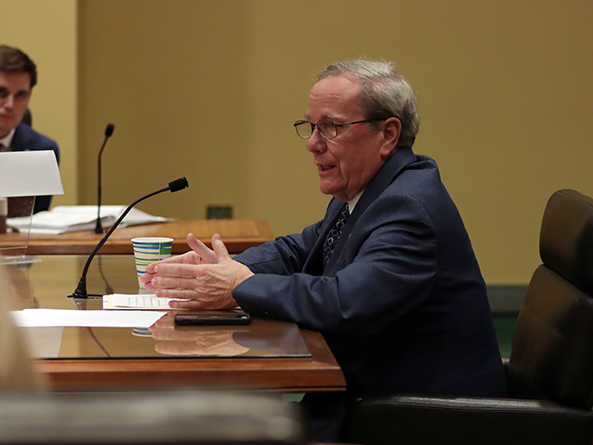Conservation exemption for road projects considered
The Transportation and Telecommunications Committee heard testimony Feb. 21 on a bill intended to better balance the conservation of Nebraska’s threatened and endangered species with highway maintenance.

Under LB1335, introduced by Columbus Sen. Mike Moser, the Nebraska Nongame and Endangered Species Conservation Act would not apply to the actions of state agencies or political subdivisions in certain circumstances when they design, construct, reconstruct, repair, operate or maintain transportation infrastructure, including roads, streets and highways.
Moser said he introduced the bill at the request of the state Department of Transportation, which has found that the current law inhibits the maintenance and improvement of existing transportation infrastructure. Under LB1335, he said, the department still would be required to comply with the law when disrupting land for new projects, but it would be exempt for subsequent work in the same area.
Moser said the bill also would clarify that highways and their associated rights-of-way are manmade structures and not intended to serve as critical habitat for endangered or threatened species.
LB1335 also would require agencies and political subdivisions — to the extent practical — to consider the impact on threatened and endangered species when designing, constructing, reconstructing, repairing, operating or maintaining transportation infrastructure.
Testifying in support of the bill was Khalil Jaber, deputy director of engineering for the state Department of Transportation. Under current law, he said, the department is required to set aside two acres for each acre it disturbs when working in the range of the American burying beetle, which in Nebraska is found mainly in the Sandhills.
Without the proposed exemption, Jaber said, the department may have to purchase easements repeatedly for the routine maintenance, repair or resurfacing of highways and rights-of-way, delaying projects and increasing costs.
Testifying in opposition to the bill was Kristal Stoner of Audubon Great Plains. She said lawmakers could better address the conflict between current law and the department’s need to maintain highways by requiring agencies to obtain a state permit for the “taking” of an endangered or threatened species that is incidental to otherwise lawful activity, as allowed under the federal Endangered Species Act.
As introduced, Stoner added, LB1335 would make it optional for an agency to restore any habitat it disturbs in the right-of-way.
“If, as a part of this construction … they destroy habitat that is needed for threatened and endangered species, they should be required to put it back,” she said.
Timothy McCoy, director of the state Game and Parks Commission, gave neutral testimony on LB1335. As introduced, the bill would allow exempted parties to ask the commission for support and recommendations relating to transportation infrastructure projects’ potential impact on threatened or endangered species.
McCoy requested that senators instead require exempted parties to consult with the commission on potential habitat restoration measures while allowing them to decide what, if any, action to take.
“If we can find a way that we can encourage good behavior and not create a future penalty for providing that conservation benefit to those species, I think it’s something we should talk about,” he said.
The committee took no immediate action on the bill.


